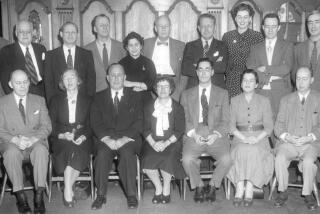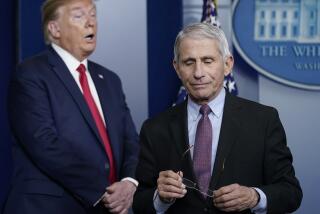A chemical nonreaction
- Share via
I DON’T WANT to alarm you. No, wait. I do want to alarm you. You and your loved ones are in danger of dying horrible, gruesome deaths at the hands of a terrorist chemical attack, and the government has refused to do anything about it.
The prospect of a chemical attack, of course, has been a favorite weapon in the Republican arsenal for years. President Bush has insisted that, after 9/11, he could not ignore the potential threat from Iraq’s weapons of mass destruction. Stopping Iraq from obtaining nuclear weapons was, in my view, a good rationale for war, but Iraq didn’t have those yet. So Bush thought it would be scarier to emphasize the stuff Iraq was known to have, namely chemical weapons. But the notion that Iraq’s chemical weapons posed any threat to us was wildly farfetched. Mustard gas is effective in trench warfare, not in cross-hemisphere attacks. Even if terrorists smuggled chemical weapons into the country, the casualties would be fairly minor.
The only way to kill lots of people with chemicals is to concentrate the chemicals in huge quantities near a big city. And, in fact, this country has lots of weapons like that. They’re called chemical plants. Attacking one with a truck bomb, or a small plane, would disperse far more toxins than any chemical weapons attack. The Congressional Research Service has found that we have 100 chemical plants that, if struck, would endanger more than 1 million lives. Indeed, U.S. intelligence has discovered that Al Qaeda has studied the possibilities.
After the 9/11 attacks, both Republicans and Democrats reacted with horror at the prospect of a terrorist chemical attack. Then-Sen. Jon Corzine (D-N.J.) sponsored a bill to require tough security measures at vulnerable chemical plants, and the Senate Committee on the Environment and Public Works passed it by a vote of 19 to 1. But lobbyists for the chemical industry went to work and persuaded Republicans to kill the bill, which they did.
The Republican position since then is that we can rely on voluntary action by the chemical industry. Newspaper exposes have shown that many plants have remained appallingly vulnerable. Domestic security experts have shouted from the rooftops that something has to be done. Nothing has.
Last week, finally, Homeland Security Secretary Michael Chertoff appeared before the American Chemistry Council to gently nudge it out of its inaction. He expressed his desire for legislation but remained vague on the details. The closest Chertoff came to a rousing call for action was his observation that “we are four years after 9/11, and the time to wait on voluntariness [sic] as the sole solution, I think, has begun to pass.” Well, let’s not rush ourselves.
You may wonder where all the so-called post-9/11 conservatives are on this issue. You know, the hawks who remind us every day that we’re still at war and insist that Sept. 11 “changed everything.” I think the answer is that they’re so wedded to the image of Bush as decisive war leader who prioritizes terrorism above all that they simply refuse to consider any evidence to the contrary.
One of the few times I’ve seen a conservative even engage the issue of Bush’s inaction on chemical security is in a book called “Bush Country,” a paean to Bush’s wisdom and greatness. The author, John Podhoretz, labels the idea that Bush has fallen short on homeland security a “crazy liberal idea.” He cites a 2003 article I wrote in the New Republic detailing the GOP’s initial cave-in on the chemical plant security bill. Podhoretz was aghast that the bill “would have authorized civil and criminal actions against plant managers and officials who supposedly weren’t doing enough to secure their facilities.”
Why is this bad? Because “such law would turn Americans against each other rather than allow them to focus on the true, external threat.” Our very social fabric would be torn -- brother against brother, chemical plant owner against nonchemical plant owner. Much better to leave the plants unprotected than risk those bitter divisions.
Podhoretz goes on to argue, in a manner revealing of the conservative mind-set, that my critique of the situation “flies in the face of the passionate seriousness with which Bush has addressed the issue of homeland security and the war on terror.” Let me translate: We know Bush is serious about homeland security because he says he is.
Of course, Bush said he was serious about planning for Hurricane Katrina too.
More to Read
Sign up for Essential California
The most important California stories and recommendations in your inbox every morning.
You may occasionally receive promotional content from the Los Angeles Times.










